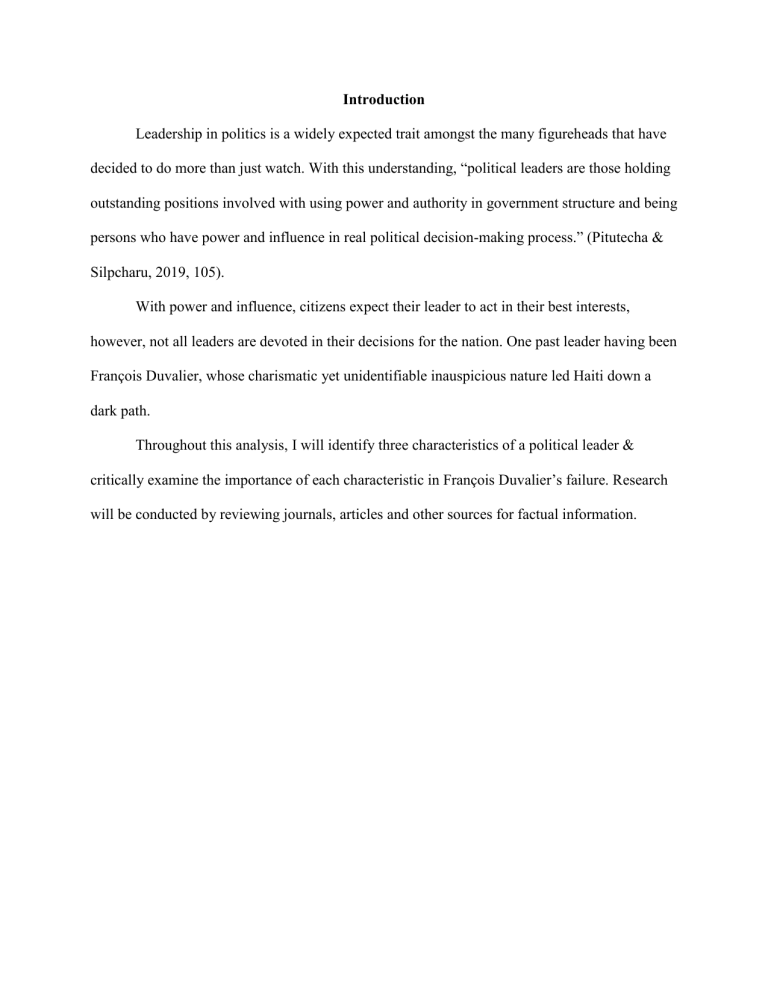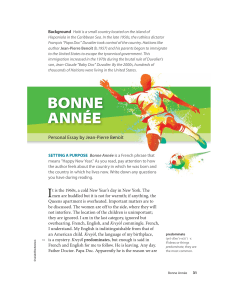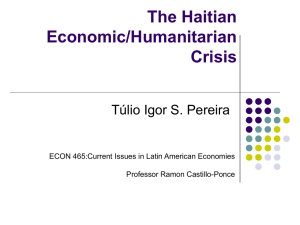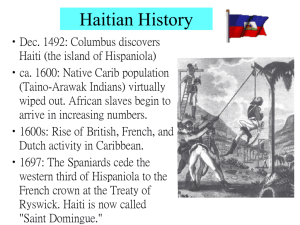
Introduction Leadership in politics is a widely expected trait amongst the many figureheads that have decided to do more than just watch. With this understanding, “political leaders are those holding outstanding positions involved with using power and authority in government structure and being persons who have power and influence in real political decision-making process.” (Pitutecha & Silpcharu, 2019, 105). With power and influence, citizens expect their leader to act in their best interests, however, not all leaders are devoted in their decisions for the nation. One past leader having been François Duvalier, whose charismatic yet unidentifiable inauspicious nature led Haiti down a dark path. Throughout this analysis, I will identify three characteristics of a political leader & critically examine the importance of each characteristic in François Duvalier’s failure. Research will be conducted by reviewing journals, articles and other sources for factual information. Characteristics of a Political Leader In a democratic society, it is important for political leaders to know that their aspirations are dependent upon the people’s favor and whether they appeal to them based on their beliefs and the decisions to be made for the country’s advancement (Langlais, 2014). Three qualities of a political leader are: ➔ Vision & Purpose: Leaders should be able to visualize the future of their country and implement the necessary plans to achieve the shared goals. To highlight their purpose, leaders express their objectives to gain support. ➔ Decision Maker: As they make plans to accomplish the country’s vision, they should consider the decisions to be made and ensure it is the right one. Bad decisions will result in an uproar from the people if it affects them negatively. ➔ Reinforce Unity & Cohesion: To accomplish the shared goals, leaders are expected to inspire their members to work together for the good of others. Since team work makes the dream work, everyone has to contribute for the best results. Importance of each Characteristic in François Duvalier’s Failure Having been involved with the people of Haiti as a Medical Doctor during the yaws endemic, Duvalier has “won a reputation as a hard‐working, somewhat self‐effacing country doctor, who could in the eyes of superstitious people, work miracles.” (Krebs, 1971) However, Duvalier failed to exhibit the characteristics of a political leader in many ways, for example: ➔ Vision & Purpose: Duvalier’s lack of vision and effort to build a model city, “Duvalierville’ costing citizens & the US Department of State millions of dollars was in vain as the complex was left unfinished & rotting. ➔ Decision Making: His most perilous decision of all was to eradicate representative democracy by abolishing all political parties and periodicals that opposed his regime. This tactic was used in response to his fear of a coup d’etat. ➔ Reinforce Unity & Cohesion: During the 1957 election campaign, Duvalier advocated for ‘undiluted Africanism’. He intended to remove economic power from all ‘mulattoes’ mixed race, a minority population in a predominantly black country. This resulted in a separation of the races. Conclusion In conclusion, Duvalier has been successful in his strive for Presidency but failed to possess the necessary characteristics that could have led Haiti to a prosperous future & not to square one. References Krebs, A. (1971, April 23). Papa Doc, a Ruthless Dictator, Kept the Haitians in Illiteracy and Dire Poverty (Published 1971). The New York Times. https://www.nytimes.com/1971/04/23/archives/papa-doc-a-ruthless-dictator-kept-thehaitians-in-illiteracy-and.html Langlais, S. (2014). The Meaning of Leadership in Political Systems. https://www.divaportal.org/smash/get/diva2:722029/FULLTEXT01.pdf Pitutecha, S., & Silpcharu, T. (2019, April). A model of political leadership characteristics leading to country development. Journal of Business and Retail Management Research (JBRMR), 13(3), 104-112. https://jbrmr.com/cdn/article_file/2019-03-31-18-01-29PM.pdf







